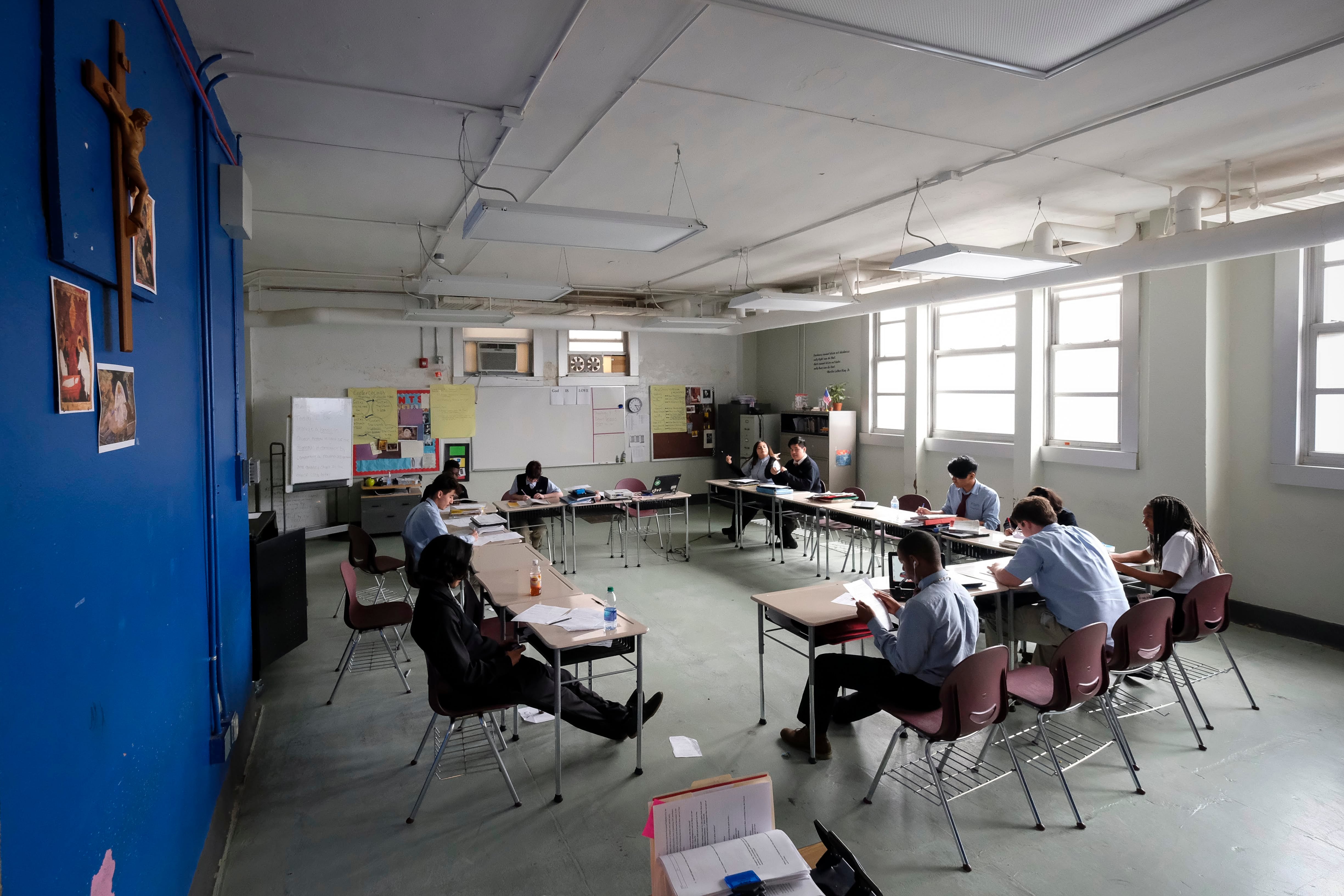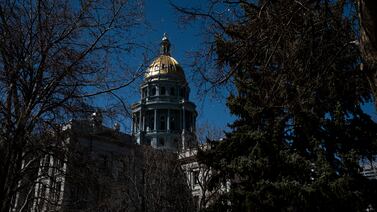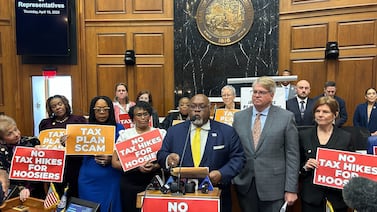Sign up for Chalkbeat’s free weekly newsletter to keep up with how public education is changing.
A state board in Oklahoma voted Monday to approve an application for the country’s first religious charter school, despite a state law prohibiting such schools.
If it opens as planned, St. Isidore of Seville Catholic Virtual School would offer students an explicitly religious curriculum based on the teachings of the Catholic Church.
The move sets the stage for a lengthy legal battle that could well reach the U.S. Supreme Court. The ensuing debate could also splinter the charter school movement. And the result could ultimately lead to the growth of religious charter schools around the country.
“Politicians in Oklahoma and some of these other states want this. They see the Supreme Court moving in that direction,” said Preston Green, an education and law professor at the University of Connecticut who has long written about the possibility of religious charter schools. “It has major implications nationwide. “
The Oklahoma Statewide Virtual Charter School Board voted 3-2 to approve the application. Last month, board members unanimously rejected the school’s initial proposal, citing a number of issues including constitutional questions about the separation of church and state.
On Monday, board members were divided on the legal implications of approving a religious charter school. Before the vote, Robert Franklin, the board’s chair, called the vote “weighty,” and warned the board that a religious charter doesn’t align with the state constitution and was “outside” the advice of the board’s legal counsel.
Another board member, Scott Strawn, said he received more than 3,000 emails about the issue. “We’ve heard… the entirety of an argument and a constitutional debate in this room today,” he said.
Franklin voted no, while Strawn voted yes. Both said they were acting according to their oaths as public officials.
A new board member, Brian Bobek, also voted yes. Franklin had asked Bobek to abstain since he had only been appointed Friday. He replaced Barry Beauchamp, who had continued to serve after his term expired, according to the Tulsa World.
Oklahoma’s charter statute states that such schools must be “free from sectarian control.” But supporters of religious charter schools insist that this prohibition amounts to religious discrimination and violates the U.S. Constitution. They cite a string of U.S. Supreme Court cases that concluded that states cannot bar private schools from receiving public funds just because they are religious.
“Recent decisions of the United States Supreme Court make clear that states may not exclude religious schools from participating in public benefit programs that support K-12 education,” the charter’s application states.
However, those rulings do not speak directly to charter schools. Such cases “concerning private schools have little precedential value as it relates to charter schools,” wrote current Oklahoma Attorney General Gentner Drummond earlier this year. (Drummond withdrew an earlier opinion from the prior attorney general, John O’Connor, who argued that Oklahoma’s bar on religious charter schools was likely unconstitutional.)
The group Americans United for Separation of Church and State said Monday that it was preparing a lawsuit over the charter approval.
Ultimately the legality of religious charter schools may hinge on whether charter schools are considered private or public entities. On Monday, the board’s legal counsel called that distinction the “heart of the matter.”
If charter schools are deemed public — “state actors” in legal terms — they would likely not be able to be religious. If they are private, the Supreme Court’s recent rulings would logically seem to apply.
Supporters have long argued that charter schools are public, and state laws define them as such. But charter schools are run by private boards, and courts have split on how to treat them for legal purposes. The U.S. Supreme Court is currently considering taking a case on whether charter schools are public or private for the purposes of a discrimination suit under the 14th Amendment.
Some legal experts believe the Supreme Court’s conservative majority would be sympathetic to religious charter schools — continuing a two-decade march of cases that have made it easier to subsidize private education with public dollars.
“I just think if this case comes up to the Supreme Court, they’ve got the numbers,” said Green.
Charter schools could face existential moment
The prospect of private, religious charter schools would amount to a stunning shift for the charter school movement. Charter schools have long garnered bipartisan support, including from many progressive supporters as an alternative to private school vouchers.
The country’s leading charter school advocacy group has staunchly opposed religious charter schools and quickly condemned Monday’s approval of the Oklahoma school.
“The Archdiocese of Oklahoma City is trying to make charter schools into something they are not,” said Nina Rees, president and CEO of the National Alliance for Public Charter Schools, in a statement. “We stand ready to support charter school advocates on the ground in Oklahoma as they fight to preserve the public nature of these unique schools and protect the religious and civil rights of the students and teachers who choose them.”
Leaders of the planned Oklahoma charter school have not said whether they would admit gay or transgender students. Oklahoma law requires charter schools to offer open enrollment and to conduct a lottery if there are more applicants than seats.
In its charter application, the church vowed to comply with state and federal law — while indicating it would seek “religious exemptions … with priority given to the Catholic Church’s understanding of itself and its rights and obligations pursuant to the Code of Canon Law and the Catechism of the Catholic Church.”
The school’s proposed employee handbook notes: “All employees are expected to adhere to and support the positions and beliefs of the Roman Catholic Church in the performance of their duties.”
Some private Catholic schools have fired teachers for marrying a same-sex partner.
“Charter school laws were passed based on assurances that they are public schools open to all students,” said Robert Kim, executive director of Education Law Center, a legal advocacy organization that is typically critical of charter schools. “Allowing a religious charter school upends the very notion of public education by endorsing a school that has signaled it does not consider itself fully bound by state or federal laws, including non-discrimination requirements, that are essential to a public education system.”
The possibility of religious charter schools could also spill beyond conservative states like Oklahoma and into blue states with charters, like California and New York. That’s because advocates of religious charter schools have argued that not only are such schools allowed, but that prohibiting them violates the Constitution.
“If they can be religious, states with charter schools must permit religious charter schools,” Notre Dame law professor Nicole Stelle Garnett, a leading advocate of religious charter schools, has argued.
The Archdiocese of Oklahoma City proposed the online charter school as a way to reach students in rural areas with few local schools. Named for the patron saint of the internet, the St. Isidore school aims to enroll students from kindergarten through 12th grade.
“The mission of St. Isidore of Seville Catholic Virtual School is to educate the entire child: soul, heart, intellect, and body,” the application states. It would seek to merge “the best of online instruction with its capacity for individualized flexible learning.”
Before Monday’s vote, several people told the board that they opposed religious charter schools.
Doug Mann, a lawyer from the Oklahoma Parent Legislative Action Committee, a group that supports public education, said it was clear from St. Isidore’s application that the school “will seek to indoctrinate” students in Catholic beliefs. He warned that the board could face a court challenge.
“There are dire consequences to this board if it goes forward with this,” he said.
Some board members who voted to approve the application Monday said they were ultimately persuaded that a no vote would violate the U.S. Constitution. Bobek, the board’s newest member, said it could “hardly be clearer to me” that it is the Oklahoma statutes that are unconstitutional.
Strawn, who had previously expressed some concerns about the application, said he concluded that voting it down would violate his oath to uphold the U.S. Constitution.
Franklin, the board’s chair, said he took the same oath, but “I just can’t get there.” He said a yes vote was a “hard no.”
Kalyn Belsha contributed to this story.
Cara Fitzpatrick is a story editor at Chalkbeat.
Matt Barnum is a national reporter covering education policy, politics, and research. Contact him at mbarnum@chalkbeat.org.





